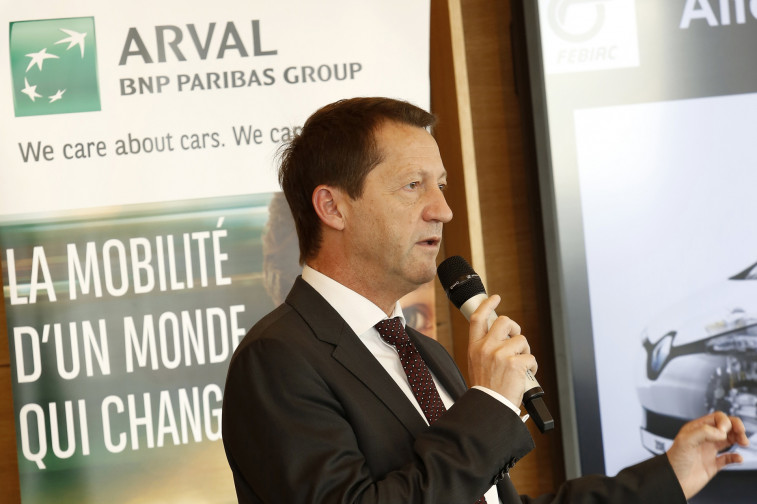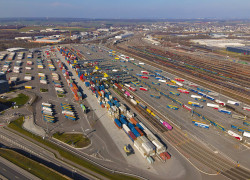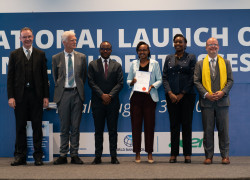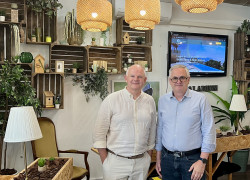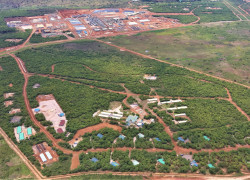ARVAL Luxembourg highlights current and future trends in the car fleet market
On Friday 20 October, Arval Luxembourg organised a conference on the topic of "Emissions and alternative engines. The manufacturers' strategy”.
A unique presentation conducted by one of our local experts: Guido Savi, Head of FEBIAC Luxembourg.
Key figures from the latest CVO survey.
Gerry Wagner, Managing Director of Arval Luxembourg, explains that as major player in the operational leasing market in Luxembourg, Arval has used the results of the 2017 edition of the "CVO Barometer" (European study on corporate car fleets conducted on the initiative of the Corporate Vehicle Observatory) to present an overview of the Luxembourg automotive market and to highlight the main trends that will characterise the evolution of professional mobility in the future.
Overview of the current vehicle fleet market
Bearing in mind every company’s own specific requirements and the growing need for service and flexibility, operational leasing remains the main financing solution in Luxembourg for 37% of companies with a fleet of at least 50 vehicles. A figure that can be put into perspective with the European trend, with a figure of 56% for the companies surveyed.
For this same business segment, 44% of those surveyed say that they may possibly develop this financing solution further by 2020. The future prospects for operational leasing in Luxembourg show a more dynamic trend than the figure observed at European level, which indicated 33% of the companies with at least 50 vehicles.
It is interesting to note that "Dieselgate" seems to be having very little influence on the car policies of companies, but the impact does seem to be more significant in Luxembourg compared to the rest of Europe.
Increasing interest in alternative energies in Luxembourg
As a result of the new fiscal reforms on the taxation of company vehicles together with the new requirements in terms of mobility, 42%, or almost half of the 220 vehicle fleet managers surveyed, said they were considering limits on CO2 emissions and promoting hybrid and petrol vehicles over the next 3 years.
This growing proportion of alternative energy in comparison to hydrocarbons is a definite trend, regardless of the technology chosen:
- 11% of the companies surveyed have already implemented hybrid technology and 30% are considering doing so by 2020;
- 11% of the companies surveyed have already implemented plug-in hybrid technology and 22% are considering doing so by 2020;
- 13% of the companies surveyed have already implemented electric technology and 25% are considering doing so by 2020.
It is worth noting that for electric engines this trend is even stronger in the segment of companies with more than 50 vehicles as 43% of them have already chosen this new solution in their fleet and 50% are considering doing so within the next 3 years.
However, according to Gerry Wagner, "the electric car is not going to simply replace conventional combustion engines, it will complement them in the initial phase. Each type of engine, whether electric, hybrid or combustion, has its place in the mobility chain. The important thing is that the needs are clearly defined".
According to the 2017 CVO study, these new solutions are currently making their mark on the Luxembourg market in comparison with the European trend, which, for example, reaches 47% for hybrid in Great Britain and 35% for electric in the Netherlands (percentage of companies that already have or are planning to integrate these new technologies).
This environmental concern is taken into account by Arval Luxembourg's expert team, beginning with the analysis phase in respect of the mobility needs of its customers.
Development of new mobility solutions
The environment is changing, home-to-workplace distances continue to increase, consumers' expectations of vehicles are evolving (particularly among young people) and work organisation now includes teleworking and the optimisation of mobility. In response to all these cultural, economic and ecological changes, businesses in Luxembourg are exploring the issue of the mobility of their staff in a new light.
It is clear that these concerns are actually being translated into reality, because today 45% of the companies surveyed in Luxembourg use at least one alternative solution, such as car sharing or the mobility budget, at 17% respectively. These figures are about the same level as the European average.
"We adapt our advice and solutions by closely following the evolution of the mobility needs of companies and future market trends. In this way a relationship of trust with all our customers can be established over the long term" comments Gerry Wagner.
Main trends in the automotive market: digitalisation, connectivity, autonomous driving and multi-modality.
Guido Savi, Head of Febiac Luxembourg, introduced his presentation by referring to the regulations and objectives of car manufacturers in relation to the emission of CO2 and other pollutants. As of 1 January 2021, car manufacturers will have to achieve a target of 95 g/km of CO2 emissions for cars and 147 g/km of CO2 for light commercial vehicles. The Member States will designate a competent authority to collect this data and communicate it to the European Commission, which will consolidate the data at European level. In order to have consumption and emission values that more closely reflect reality, the European Commission has introduced a new test, the WLTP (Worldwide Harmonized Light Vehicles Test Procedure) for certification of cars and light commercial vehicles. This new laboratory-based test replaces the NEDC (New European Driving Cycle) test in September 2017 for new certifications and in September 2018 for new registrations. The WLTP test is more demanding in terms of acceleration cycles, speed (up to 140 km/h), distance covered (23 km) and will take into account vehicles' equipment and accessories. This test measures CO2, NOx (nitrogen oxide) and particles, both in terms of mass and number.
The second part was devoted to alternative engines, which represent a genuine revolution for the automotive sector. Sales of hybrid vehicles increased by over 25% between 2015 and 2016, and growth continues to accelerate. The approach of the car manufacturers is to adopt a neutral position in relation to the new engines. It is important to offer consumers a range of choices and not to promote one single solution. Each engine has its own particular advantages and responds to specific needs.
Communiqués liés
RSA launches technology and management liability insurance s...
RSA Luxembourg, part of Intact Insurance Specialty Solutions, today announces th...
Lancement d'une nouvelle connexion intermodale entre Bettemb...
CFL multimodal a le plaisir d'annoncer le lancement de sa nouvelle connexion i...
Experts from LUNEX award first micro-credentials in Rwanda o...
The Rwanda Ministry of Education (MINEDUC) formally inaugurated Syllabi, a publi...
ERG Notes that ENRC Secures Landmark Victory as Court of App...
Eurasian Resources Group (ERG), a leading diversified natural resources group he...
LetzToken et La Vie est Belle annoncent leur partenariat ouv...
«?LetzToken?», plateforme de tokenisation pionnière basée à Luxembourg, et ...
ERG announces a Pre-Export Finance Facility Agreement based ...
Eurasian Resources Group (“ERG”, “The Group”), a leading diversified nat...
Il n'y a aucun résultat pour votre recherche

